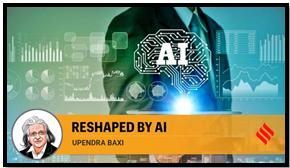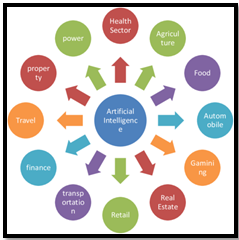RESHAPED BY AI
Principle of territorial sovereignty is transforming into digital sovereignty. No tech governance can ignore this
Relevance:
GS 3
- Science and Technology- developments
- Achievements of Indians in science & technology; indigenization of technology and developing new technology.
Why in News:
Recently, UNESCO called for regulations on AI use in schools.
Source- IE
In a world marked by global politicking and the aftermath of 2023’s conflicts and anthropogenic harm, various committees and organizations are quietly working on initiatives for human rights and AI governance.
The UN’s Ethical AI Framework:
- In October 2023, the United Nations Children’s Fund (UNICEF) hosted a joint session of the High-Level Committee on Programmes and the High-Level Committee on Management to discuss the use and governance of AI and related frontier technologies.
- The UN had previously initiated work on “frontier technologies” and AI, creating a strategic approach and road map for capacity development in 2019.
- UNESCO’s declaration provided ethical principles for AI use within the UN system, emphasizing human rights, ecological sustainability, diversity, inclusiveness, good governance, and just development.
- A “system-wide normative and operational framework on the use of AI in the United Nations system” was recommended, built on these ethical principles.
Digital Sovereignty and AI:
- The principle of territorial sovereignty is evolving into digital sovereignty as transborder, multilevel AI governance becomes central to corporate governance.
- Data accumulation is transforming sovereignty over peoples and nations.
- AI has revolutionized warfare with the use of unmanned lethal autonomous weapons systems(LAWS), leading to dehumanization and challenges to international humanitarian law.
- The need to “humanize” AI applications in all contexts is essential to prevent dire consequences.
Threats to Democracy and Privacy:
- AI tools, driven by Big Data Analytics and the Internet of Things, pose threats to democracy by manipulating preconditions and levers of decision-making and information privacy.
- AI’s primary function is capturing personal information, creating detailed behavioral profiles, and influencing economic and political choices.
- Privacy, anonymity, and autonomy are at risk unless global, regional, and national actions are taken promptly.
Competing Digital Empires:
- The digital conflict between the US and China represents competing “digital empires.”
- The US follows a techno-optimistic model, allowing complete freedom to the AI industry, promoting free speech, and open markets.
- China’s state-driven regulatory model gains popularity worldwide, raising concerns about its oppressive nature.
- Developing authoritarian countries find China’s model appealing for combining political control with technological success.
- Some democratic societies prefer the EU model, emphasizing human rights as a precondition for inclusive and sustainable development.
The Uncertain Future of AI:
- The technopolitical landscape presents an uncertain future, with surveillance capitalism, digital authoritarianism, and liberal democratic values vying for dominance.
- The choice between these models will shape human engagement and society as we advance into the digital era.
AI’s impact on warfare and governance necessitates ongoing efforts to humanize AI applications and establish ethical frameworks. The choices made in the realm of AI will profoundly affect the future of humanity and the digital age.
| AI laws in India
· While India lacks specific AI laws, MeitY oversees AI regulatory development. · Existing IT Act provisions apply to crimes involving AI. · The 2021 IT Rules require due diligence on social media content. · The 2018 National Strategy on Artificial Intelligence considers regulatory oversight by relevant ministries. · NITI Aayog’s AIRAWAT initiative focuses on AI research and application. · A 2020 NITI Aayog draft proposes an oversight body for AI, emphasizing principles like safety, equality, and transparency. Applications of AI
· Automation: AI automates repetitive tasks, improving efficiency and reducing errors in industries like manufacturing and customer support. · Healthcare: AI aids in disease diagnosis and drug discovery, while also assisting in personalized treatment plans and analyzing medical images. · Natural Language Processing (NLP): NLP enables machines to understand and generate human language, used in translation, sentiment analysis, and virtual assistants. · Recommendation Systems: AI-driven recommendations personalize content and product suggestions based on user behavior, seen in platforms like Netflix and Amazon. · Autonomous Vehicles: AI powers self-driving cars and drones by processing sensor data for real-time driving decisions, enhancing safety and reducing traffic congestion. |
Source
Indian Express
Mains Question
Examine the concept of “Digital Sovereignty” in the context of Artificial Intelligence (AI) and its influence on global governance. Discuss the ethical framework established by the United Nations for AI use and its significance.

 Source- IE
Source- IE Source: Research gate
Source: Research gate

